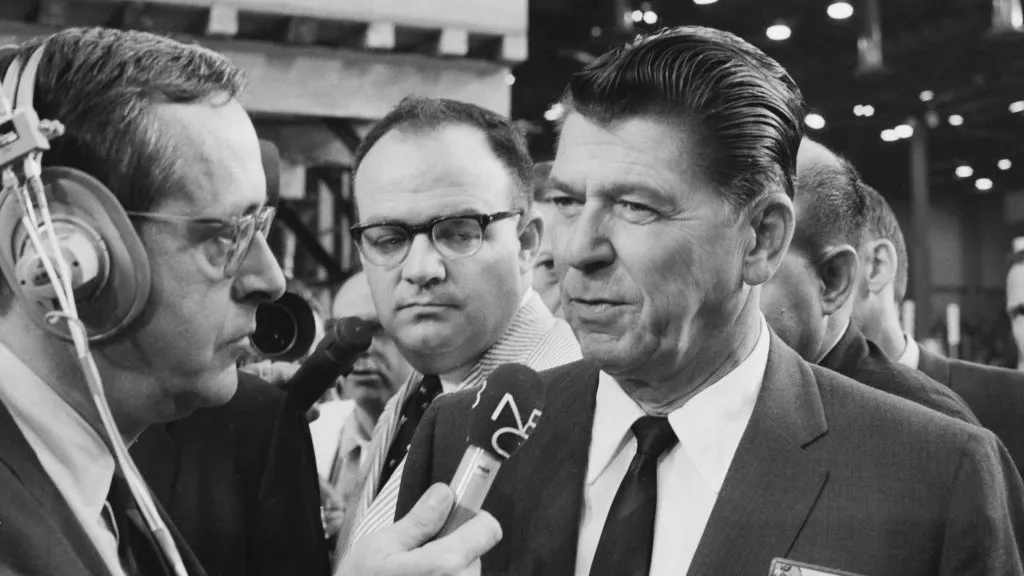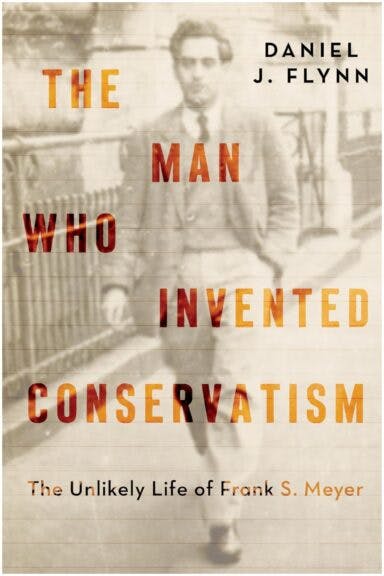The following excerpt is taken from “The Man Who Invented Conservatism: The Unlikely Life of Frank S. Meyer,” by Daniel J. Flynn, (Encounter Books, August 19, 2025)
* * *
“For the first time in the past few months I find myself viscerally as well as intellectually deeply concerned about the immediate future of the country,” Frank Meyer wrote in March 1968 to co-founder of National Review Willi Schlamm in Europe. “Between Vietnam, this summer’s projected insurrectionary riots, and the real threat to twenty years of economic stability that the monetary situation poses, almost anything could happen.”
Everything did.
Lyndon Johnson soon announced his decision to neither seek nor accept the Democratic Party’s presidential nomination. Days later, a career criminal on the run after escaping prison murdered Martin Luther King Jr. The tragedy, and the initial elusiveness of the murderer, fueled riots that killed dozens in Chicago, Washington, D.C., Baltimore, and points beyond. Uprisings that spring plagued campuses. Columbia, where student activists occupied university buildings and held administrators hostage, served as the focal point. In June, Sirhan Sirhan, a Palestinian immigrant incensed over U.S. aid to Israel, murdered Robert Kennedy. All the while the Vietnam War reached peak violence; more than three hundred American men died in combat each week.
The chaos jarred Meyer. Even prior to Kennedy’s murder, the National Review columnist had described the times as the most fateful for Americans since Fort Sumter. The upheaval, he reasoned, emanated not from deprivation but abundance. This did not lead to a more contented society. Riots, campus takeovers, civil disobedience, crime, and other actions often vaguely or specifically linked to political demands counterintuitively followed. The more authorities rewarded disobedience, disorder, and disregard for law, the more disobedience, disorder, and disregard for law proliferated. The damage from nihilism and a West alienated from itself, he concluded, bore this bitter fruit of attempted civilizational suicide.
His articles adopted an ominous tone. More shocking to readers, his order-liberty emphasis flipped. He still articulated libertarian positions in opposing the draft and in shunning calls for gun control in the wake of the assassinations (“An unarmed citizenry is potentially the victim, first of anarchy, then of tyranny and totalitarianism”). The holstered firearm spotted under his jacket at a Philadelphia Society meeting in Chicago, where American Communists knew him best, indicated he practiced what he preached. The times dictated a condemnation of freedom’s unsavory cousin chaos. In March, Richard Nixon identified order as the priority. Meyer followed that summer by telling readers that “order is the first condition of civilizational existence, the only foundation of freedom and well-being for anyone and everyone.”
His son John’s attendance at Columbia amid the takeover and riots laying waste to his hometown of Newark the previous summer personalized the events. So did his own history. He had once stood on the other side of the barricades. If he regarded many antiwar protestors as effectively aiding the Vietcong, then he surely recalled his own role in the 1930s peace movement that had softened Great Britain, the United States, and other countries. Meyer the Communist had shouted down speakers, disrupted meetings, and scoffed at campus authorities the way Mark Rudd now did. He saw others reliving his life and wanted to stop them from inflicting the damage that he had once caused.
“The issue facing the United States this summer is the survival of a free society,” he told readers. “No society can exist in a state of endemic disorder. Specifically, a representative republic cannot function if its magistrates and its representative assemblies are subject to blackmail by mob violence.” From Death Valley Days came a sheriff to make things right.
Meyer saw in Ronald Reagan the figure to lead Americans out of the smoke, grime, and darkness of 1968 to a place more resemblant of America. Some regarded this as a pipe dream; others as unwise.
◆ ◆ ◆
HUGH KENNER wrote William F. Buckley, Jr., a private letter critical of his “Ronald Reagan: A Relaxing View,” an unusually long cover article. Kenner explained of his letter to Guy Davenport, “It is to their honor that they want it revised for print. Imagine, per contra, The Nation running a pro-Reagan piece.” Not everyone welcomed Buckley’s tolerance. And, because
of that, Kenner’s view of the magazine changed. “Communication from WFB just re[a]d from Switzerland says that my Nervous View of Ronald Reagan has been held over till April (!) at Frank Meyer’s (!!) intervention, in the interests of fairness, Frank having held that Reagan (!!!) should be given a chance to reply,” Kenner wrote Davenport. “If Reagan does not, the accompanying rebuttal will be by Frank (!!!!).”
Behind the scenes, a January editorial meeting resulted in the board’s endorsement of Meyer’s personally rebutting the anti-Reagan piece. In February, Bill Rusher supplied the Master — the sobriquet he had long ago given to Meyer — with a dossier. Jeffrey Hart later received the task of writing the Meyer-engineered counterpoint to an article preoccupied with Reagan’s treatment of the universities. This substitution, given that it negated one English professor’s charge of anti-intellectualism with another’s rebuttal, struck as a master stroke to anyone paying attention but too cute by half to anyone really paying attention.
When “A Nervous View of Ronald Reagan” ran in May as an “Open Question,” Kenner, though a major asset as a literary critic, appeared outside of his element. Unlike Davenport, who had threatened to resign in 1965 after being assigned to cover a Philadelphia Society meeting, Kenner did subscribe to the general tenets that animated National Review. Nevertheless, the University of California–Santa Barbara professor came off as a parochial cosmopolitan in portraying California’s governor as a philistine for supporting the firing of the university system’s president, Clark Kerr, and for his periodic clashes with academia, which to many conservatives increasingly resembled a left-wing training ground. The philistinism, to them, occurred among the people perverting intellectual pursuits toward the service of narrow, ideological ends.
End of Summer Sale – Get 40% off New DailyWire+ Annual Memberships
Hart, on leave from both Dartmouth and National Review to write speeches for Reagan, authored the “Open Question” that appeared immediately after Kenner’s. He juxtaposed Reagan’s widely shared critique of the campuses with Kenner’s use of “zamindary,” a ten-cent word even by National Review standards. He wondered why Kenner must psychoanalyze his subjects as though the mind holds the answer for all questions. For Kenner this undoubtedly avouched philistinism’s further inroads on the intellectual right; for many readers, it likely contrasted California’s man of the people with yet another of its professors above all in an ivory tower. The byline did not fully obscure who lurked behind every word. As a bewildered Davenport had explained to Kenner, “Frank thinks that Reagan ought to be president of the USA.”
Kenner lost sleep. He went from gaining respect for the magazine to losing it. Buckley, though playing a passive role, allowed this to happen. He acted as godfather to Kenner’s daughter, paid for another daughter’s freshman year at college, and served as best man at the widowed Kenner’s second wedding. The active involvement of his other friend of more than a decade, the editor of his book reviews, sharpened the sting. So did yet another colleague’s mockery of him in print as an egghead. “I can sympathize with you,” Davenport wrote, “knowing how I would feel to be hee-hawed at by a cold bastard like Hart who can scarcely hide the fact that he has been called in to wipe a well-aimed egg off a politician, and to denounce the opposition with cultivated yelps and whimpers.” Meyer lost his section’s most accomplished literary critic.
He pleaded with Davenport to beg his friend back. The last issue in May listed Kenner as an associate. Any trace of him had disappeared from the masthead by June.
Meyer succeeded in shielding his favored candidate but at terrible cost. The tear revealed the frayed fabric holding together the two elements — the cynosure for conservatives and a citadel for refined literary appraisal — that made National Review great. Meyer could play conservative pope. He could serve as keeper of culture. Could he play both? The question did not always yield an answer in the affirmative.
◆ ◆ ◆
THE SAME WEEK that National Review offset Kenner’s criticism with Hart’s rebuttal, The New Republic published Meyer’s “Why I Am for Reagan,” one in a series from supporters of the various presidential contenders. The magazine commissioned Meyer to write the piece for obvious reasons. His campaign for Reagan began the moment the campaign for Goldwater ended.
In December 1964, Meyer spotlighted Reagan as the Republican future. The veteran actor had delivered a compelling infomercial for Goldwater that aired a week before the election. He did not merely replace Goldwater’s scowl with a smile. He eviscerated Great Society liberalism with humor, anecdotes, and folksy logic. Reagan connected. One could almost see the studio audience, and Frank Meyer listening in his living room, wondering, “Why can’t I vote for this man?” People who knew him as a star nevertheless experienced a revelation that night that they had watched, well, a star.
Reagan parlayed that speech into a run for governor in the state that suddenly boasted the most people. He vanquished Nixon’s vanquisher. Weeks before Reagan assumed office, Meyer touted him as the next president. As with Goldwater, the enthusiasm masked a Johnny Bravo quality. Ronald Reagan nevertheless fit the suit better.
Reagan met the requirements of “a candidate who can stir conservative enthusiasm and behind whom a campaign for delegates to the Republican National Convention of 1968 can be launched,” “Principles and Heresies” maintained in 1966. “By the principled positions he has taken, and by his proven ability as a campaigner, demonstrated both in 1964 and this year in California, Ronald Reagan, should he prove the governor he promises to be, qualifies for this role.”
Rusher shared Meyer’s enthusiasms. Buckley touted Reagan, too. Again, James Burnham opposed.
“I insist that Reagan is a serious candidate,” Meyer responded to Burnham’s insistence to the contrary. “Furthermore, if it were journalistically advisable to support a single candidate, it would unquestionably be our duty to make Reagan our choice with Nixon as our second choice.”
* * *
This excerpt from “The Man Who Invented Conservatism,” by Daniel J. Flynn is published by permission of Encounter Books.
Daniel J. Flynn is a senior editor of The American Spectator and a visiting fellow at the Hoover Institution. He has authored seven books, including “Blue Collar Intellectuals: When the Enlightened and the Everyman Elevated America;” “A Conservative History of the American Left;” and “Cult City: Jim Jones, Harvey Milk, and 10 Days That Shook San Francisco.”
The views expressed in this excerpt are those of the author and do not necessarily represent those of The Daily Wire.


.png)
.png)

